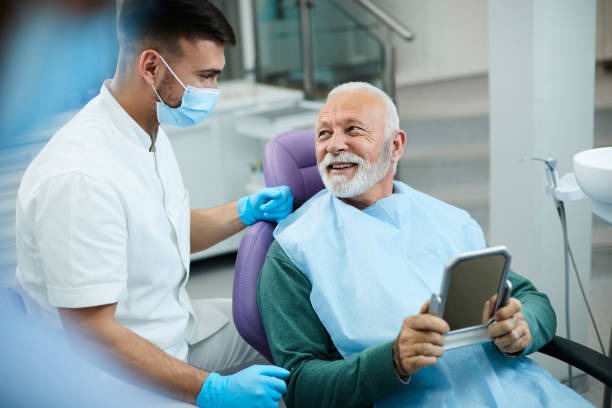Sleep apnea, a prevalent sleep disorder characterized by repeated interruptions in breathing during sleep, affects millions of people worldwide. While its effects on general health are often discussed, many need to be made aware of its significant impact on dental health. In this article, we will discuss how sleep apnea can influence oral wellness and what measures can be taken to mitigate these effects.
What is Sleep Apnea?
Sleep apnea occurs when the airway is partially or completely blocked during sleep, causing breathing to stop and start repeatedly. This condition can lead to a range of health issues, from daytime fatigue and irritability to more severe problems like cardiovascular diseases. There are three main types:
-
Obstructive Sleep Apnea (OSA): The most common form caused by the relaxation of throat muscles.
-
Central Sleep Apnea: Unlike OSA, the airway isn’t physically blocked. Instead, the brain fails to signal the muscles to breathe due to instability in the respiratory control center.
-
Complex Sleep Apnea Syndrome: Also known as treatment-emergent central sleep apnea, it is a combination of both obstructive and central sleep apnea.
Connections Between Sleep Apnea and Dental Health
It may come as a surprise to learn that sleep apnea is closely linked to several dental health problems. Here’s how sleep apnea can lead to dental issues:
-
Bruxism (Teeth Grinding): Many individuals with sleep apnea unconsciously grind their teeth in their sleep. This can cause tooth wear and tear, sensitivity, and even broken teeth.
-
Dry Mouth: Sleep apnea often leads to mouth breathing, which reduces saliva flow and results in dry mouth. This can amplify the risk of gum disease, tooth decay, and mouth infections.
-
TMJ Disorders: The stress on the jaw from frequent teeth grinding may result in temporomandibular joint disorders, causing pain and dysfunction in the jaw joint and the muscles that control jaw movement.
-
Gum Disease: People with sleep apnea are prone to having higher levels of inflammation in the body, which can increase the risk of gum disease.
Diagnosing Sleep Apnea
Dentists are often the first health professionals to notice potential signs of sleep apnea due to their unique position to observe oral indicators during routine check-ups. They can detect signs of teeth grinding (bruxism), which is frequently associated with sleep apnea. Observing excessive wear on teeth can suggest nocturnal activities that point towards this disorder. Dentists might also note other oral symptoms that are linked with sleep apnea, including:
-
Dry mouth: Often a result of sleeping with an open mouth, which is common in cases where breathing disturbances occur.
-
Gum inflammation: Can be exacerbated by poor sleep and related immune responses or from mouth breathing.
Checking the alignment of the jaw and the size of the airway during a dental examination can provide additional clues. A small or recessed jaw, for example, might suggest a narrower airway, increasing the risk of sleep apnea.
Preventive Measures and Treatments
Dealing with sleep apnea involves various strategies, ranging from lifestyle changes to medical interventions:
-
Lifestyle Modifications: Weight management, quitting smoking, and reducing alcohol consumption can alleviate symptoms of sleep apnea.
-
Positive Airway Pressure Devices: Devices like CPAP machines keep the airway open during sleep, ensuring continuous breathing.
-
Oral Appliances: Certain dental devices can adjust the position of the mouth to help maintain an open airway throughout the night.
Oral Appliance Therapy
One effective treatment for mild to moderate obstructive sleep apnea is Oral Appliance Therapy (OAT). Dentists custom-make these devices to suit the patient’s oral structure, helping to keep the throat open. Appliances like mandibular advancement devices (MADs) are especially common. They slightly push the lower jaw forward and down, which helps keep the airway open.
Choosing the right type of oral appliance and getting a custom fitting from a dentist is essential for the effectiveness of the treatment. Health professionals like a cosmetic dentist in Central Park often provide services that not only improve aesthetic appearances but also contribute to better overall oral health by managing conditions such as sleep apnea.
Impact of Untreated Sleep Apnea on Oral Health
Ignoring sleep apnea can have severe implications for oral health, a concern that the experts at Studio 57 Dental are well aware of. Chronic teeth grinding, a common symptom of untreated sleep apnea, can result in extensive dental damage and increased sensitivity or pain. Furthermore, untreated sleep apnea often leads to progressive gum disease due to systemic inflammation.
Finding the Right Help
If you suspect that you might be suffering from sleep apnea, it’s crucial to seek professional advice. A comprehensive approach includes consulting with both your dentist and a sleep specialist. Clinics offering sleep apnea treatment in Central Park provide both diagnosis and personalized treatment plans, ensuring a multidisciplinary approach to managing sleep apnea.
Final Thoughts
Sleep apnea is more than just a cause of snoring; it has significant repercussions for dental health. Understanding the link between sleep apnea and oral health problems is crucial for preventing more serious health issues down the line. With the right information and professional help, managing sleep apnea can lead to improved overall health and a better quality of life.



